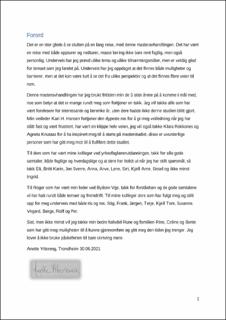Digitalisering -Yrkesfaglærerens profesjonsfaglige digitale kompetanse ved TIF Vg1
Master thesis

Permanent lenke
https://hdl.handle.net/11250/2785171Utgivelsesdato
2021Metadata
Vis full innførselSamlinger
- Institutt for lærerutdanning [3814]
Sammendrag
Studien innen yrkesdidaktikk tar sikte på å belyse hva som kjennetegner yrkesfaglærernes profesjonsfaglige digitale kompetanse i undervisning i TIF VG1. Å være yrkesfaglærer ved TIF Vg1 kan beskrives som en hverdag som byr på et mangfold av opplevelser. Digitalisering er en del av samfunnet, å se ulike muligheter, tilnærminger, beslutninger og strategier innen digitalisering er en stor del av arbeidshverdagen som gjør jobben både inspirerende og interessant.Min kvalitative studie bygger på empiri fra semistrukturerte intervju med 7 yrkesfaglærere og en semistrukturert spørreundersøkelse med 59 yrkesfagelever ved TIF Vg1. Som følge av å velge et epistemologisk perspektiv fra Vygostky, som viser en bred forståelse av kunnskaps-grunnlaget, er metodevalget eksplorativt casestudie. Teoretisk perspektiv ligger i Deweys transaksjonelle læringsteori (1949) og George Siemens teori om konnektivismen (2004). Innen fagopplæringens tradisjoner kan vi kjenne igjen mye fra Deweys (1949) transaksjonelle teori. Men etter hvert som digitaliseringen øker i samfunnet er den alene ikke dekkende, sammen med konnektivismen mener jeg de utfyller hverandre i forhold til å drive yrkesopplæring i skolen. Formålet med studien er å utvikle en større innsikt i hva som kjennetegner bruken av digitalisering i yrkesopplæringen og hvordan dette påvirker daglig undervisning ved TIF Vg1, etter innføringen av det digitale læreplanverket LK20. Hovedfokuset i intervjuene med yrkesfaglærerne er hva som kjennetegner deres bruk av digitalisering i daglig undervisning ved TIF Vg1 både innen faglig og digital kompetanse. I spørreundersøkelsen med yrkesfagelevene har formålet vært å belyse hvordan de erfarer bruken av digitalisering i yrkesopplæringen og deres ønsker for hvordan yrkesopplæringen bør foregå Funnene viser at yrkesfaglærernes rolle er i betydelig endring etter innføringen av det digitale læreplanverket LK20. Yrkesfaglærernes fagkompetanse påvirkes positivt av digitalisering innen yrkesopplæringen. I daglig undervisning viser funnene at yrkesfaglærernes profesjonsfaglige digitale kompetanse påvirker yrkesdidaktisk tilnærming til digitale verktøy. Funnene viser også at yrkesfaglærerne er usikre på hvordan digitale relasjoner til yrkesfagelevene bør foregå og etterlyser avklaring. Yrkesfagelevene ønsker at yrkesfaglæreren er tilstede i digital undervisning, 66 % ønsker å kun lære digitale programmer som er relevante for eget yrkesvalg. Samtidig ønsker yrkesfagelevene en utvikling mot mere spillbasert læring, noe yrkesfaglærerne ikke har nevnt. Men viktigst er utsagnet om at selv ved bruk av digitalisering, må vi ikke glemme at vi driver opplæring til praktiske yrker. The study in vocational didactics aims to shed light on what characterizes the professional digital competence of vocational teachers in teaching in TIF VG1. Being a vocational teacher at TIF Vg1 can be described as an everyday life that offers a multitude of experiences. Digitalization is part of society, seeing different opportunities, approaches, decisions, and strategies in digitalization is a big part of everyday work that makes the job both inspiring and interesting.My qualitative study is based on empirical data from semi-structured interviews with 7 vocational teachers and a semi-structured survey with 59 vocational students at TIF Vg1. As a result of choosing an epistemological perspective from Vygostky, which shows a broad understanding of the knowledge base, the choice of methodology is exploratory case study. The theoretical perspective is based on Dewey's (1949) transactional learning theory and George Siemens (2004) theory about connectivity. Within the traditions of vocational training, we can recognize a lot from Dewey's (1949) transactional theory. But as digitalization increases in society, it alone is not comprehensive, but along with connectivity, I think they complement each other in terms of vocational training in schools. The purpose of the study is to gain insight into what characterizes the use of digitalization in vocational training and how this affects daily training in TIF Vg1, after the introduction of the digital curriculum LK20. The focus in the interviews with the vocational teachers is what characterizes their use of digitalization in daily training at TIF Vg1 in both vocational didactics and digital competence. In the survey with vocational students, the purpose has been to shed light on how they experience the use of digitalization in vocational training and their wishes for how vocational training should take place.The findings show that the role of the vocational teachers is changing significantly after the introduction of the digital curriculum, LK20. The vocational teachers' professional competence is positively influenced by digitalization in vocational training. In daily teaching, the findings show that the teachers’ professional digital competence influences the vocational didactic approach to digital tools. The findings also show that vocational teachers are uncertain about digital relations with vocational students should take place and are calling for clarification. Vocational students want the vocational teacher to be present in digital teaching, 66% want to learn only digital programmes that are relevant to their own choice of profession. At the same time, vocational students wants the vocational training to be evolving towards more game-based learning, something that the vocational teachers have not mentioned. But most importantly, the statement is that even with the use of digitalization, we must not forget that we train for practical professions.